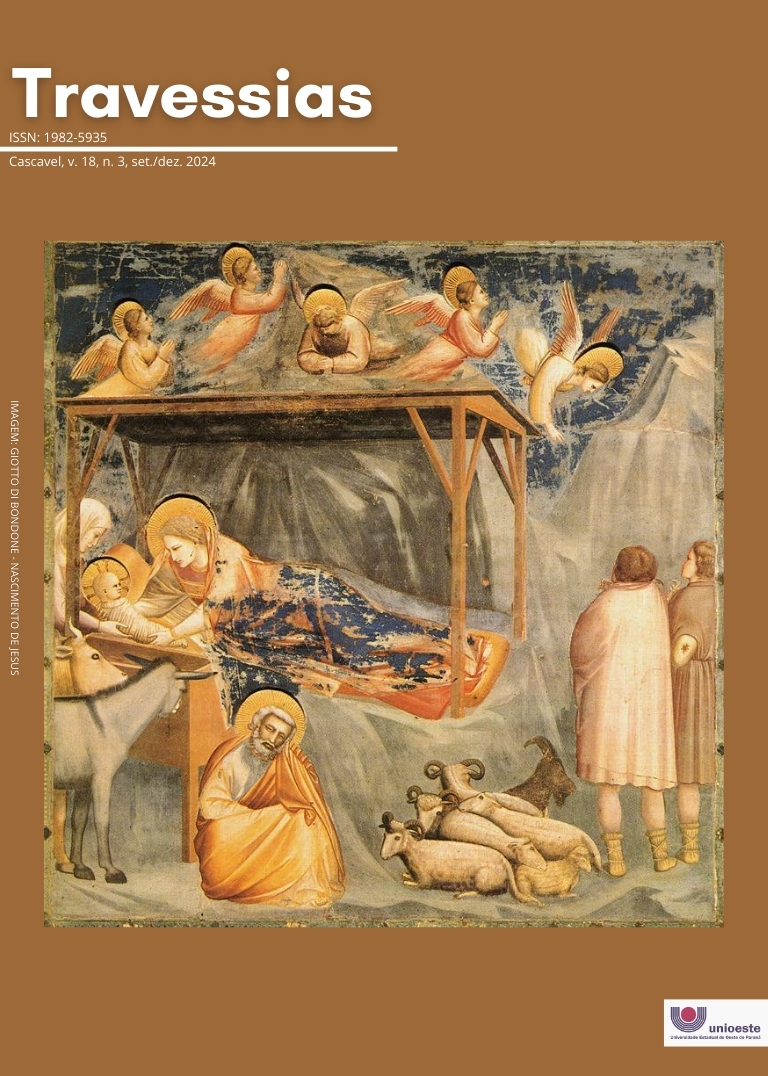Paródia e ironia
apropriação transgressora do texto bíblico em “A paixão Segundo G.H.”, de Clarice Lispector
DOI:
https://doi.org/10.48075/rt.v18i3.34315Palavras-chave:
Literatura Brasileira, Clarice Lispector, A Paixão segundo G.H. , Paródia, IroniaResumo
É senso comum a identificação dos teóricos, que se dedicam ao estudo da obra de Clarice Lispector, em especial com relação à presença de algumas religiões ocidentais e orientais em A paixão Segundo G.H. No entanto, este artigo propõe identificar, particularmente, a apropriação do texto bíblico nessa obra em específico, bem como a forma transgressora, com raras exceções, em que a narradora personagem do romance utiliza desse texto religioso, sem pudor em subvertê-lo por meio da paródia e da ironia. Com isso, a metodologia é qualitativa e pauta-se na utilização de textos teóricos e críticos visando o método de coleta de dados do material selecionado para realização da análise textual. Assim sendo, intenta-se identificar trechos bíblicos mais relevantes aplicados à tessitura do texto e, além disso, abordar em como a paródia e ironia o compõe e como Lispector constrói sua personagem protagonista G.H. e a narrativa literária. Ademais, Lispector explora, nesse romance, dimensões imaginárias e subjetivas do texto bíblico e, sobretudo, fornece o lugar de sujeito à linguagem que cria em torno de si mesmo um labirinto cujo destino final se encontra em seu âmago, seu interior. Para tanto, utilizam-se como autores: Antonio Candido (2009), Benedito Nunes (1969; 1973; 1995), Maria José Barbosa (2001), Rodrigo Guimarães (2010), Linda Hutcheon (1985; 2000), dentre outros. A narrativa se espraia, inicialmente, em torno do ritual de arrumação que a personagem realiza em seu apartamento e, contudo, percebe-se neste a metáfora da peregrinação e ascensão de ordem introspectiva. Portanto, no quarto da empregada, primeiro cômodo a ser organizado, G.H. defronta-se com uma barata, animal ancestral que conecta e instaura um ponto iniciático para uma longa etapa de reflexão e fluxo de consciência da protagonista, pois é o início de um novo tempo, ciclo de descobertas diante do mundo e, sobretudo dentro de si mesma.
Downloads
Referências
ARÊAS, Vilma. Clarice Lispector: com a ponta dos dedos. São Paulo: Companhia das Letras, 2005.
ARFUCH, Leonor. O Espaço Autobiográfico. Rio de Janeiro: EDUERJ, 2010.
BARBOSA: Maria José Somerlate. Clarice Lispector: desfiando as teias da Paixão. Porto Alegre; EDIPUC-RS, 2001.
BÍBLIA SAGRADA. Traduzida da vulgata e anotada pelo Pe. Matos Soares. 19. ed. São Paulo: Edições Paulinas, 1964.
CANDIDO, Antonio. A educação pela noite e outros ensaios. 2. ed. São Paulo: Ática, 1989.
GUIMARÃES, Rodrigo. “E” (Ensaios de literatura e filosofia). Rio de Janeiro: 7 Letras, 2010.
HUTCHEON, Linda. Teoria e política da ironia. Tradução de Julio Jeha. Belo Horizonte: Editora da UFMG, 2000.
HUTCHEON, Linda. Uma teoria da paródia. Rio de Janeiro: Edições 70, 1985.
LISPECTOR, Clarice. A paixão segundo G.H. São Paulo: Rocco, 2009.
NUNES, Benedito. Leitura de Clarice Lispector. São Paulo: Quíron, 1973.
NUNES, Benedito. O Dorso do Tigre. São Paulo; Perspectiva, 1969.
NUNES, Benedito. O Drama da Linguagem: Uma leitura de Clarice Lispector. Ática; São Paulo, 1995.
Downloads
Publicado
Como Citar
Edição
Seção
Licença
Copyright (c) 2024 Autores mantêm os direitos autorais e concedem à revista o direito de primeira publicação, com o trabalho simultaneamente licenciado sob CC-BY-NC-SA 4.0 que permite o compartilhamento do trabalho com indicação da autoria e publicação inicial nesta revista

Este trabalho está licenciado sob uma licença Creative Commons Attribution-NonCommercial-ShareAlike 4.0 International License.
Aviso de Direito Autoral Creative Commons
Política para Periódicos de Acesso Livre
Autores que publicam nesta revista concordam com os seguintes termos:
1. Autores mantêm os direitos autorais e concedem à revista o direito de primeira publicação, com o trabalho simultaneamente licenciado sob a Licença Creative Commons Attribution que permite o compartilhamento do trabalho com reconhecimento da autoria e publicação inicial nesta revista.
2. Autores têm autorização para assumir contratos adicionais separadamente, para distribuição não-exclusiva da versão do trabalho publicada nesta revista (ex.: publicar em repositório institucional ou como capítulo de livro), com reconhecimento de autoria e publicação inicial nesta revista.
3. Autores têm permissão e são estimulados a publicar e distribuir seu trabalho online (ex.: em repositórios institucionais ou na sua página pessoal) a qualquer ponto antes ou durante o processo editorial, já que isso pode gerar alterações produtivas, bem como aumentar o impacto e a citação do trabalho publicado (Veja O Efeito do Acesso Livre).
Licença Creative Commons
Esta obra está licenciada com uma Licença Creative Commons Atribuição-NãoComercial-CompartilhaIgual 4.0 Internacional, o que permite compartilhar, copiar, distribuir, exibir, reproduzir, a totalidade ou partes desde que não tenha objetivo comercial e sejam citados os autores e a fonte.



